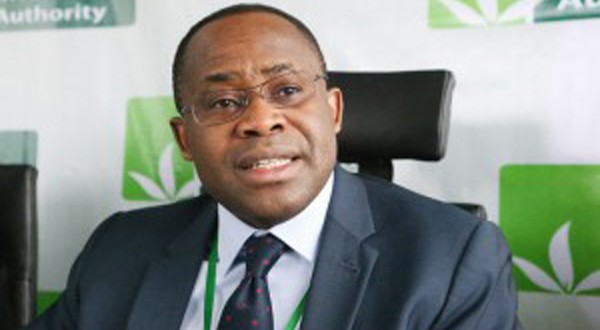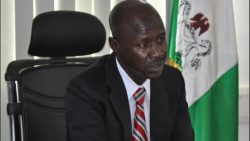James Ume
Less than seven months after Audu Ogbe, Minister of Agriculture promised the nation that the government was poised to crash fertilizer price down to N6,000 or below, tangible evidence has emerged that this is a promise kept.
Last Monday. Uche Orji, the ebullient Managing Director of the Nigerian Sovereign Investment Authority, NSIA, revealed that the Authority had put back to work 11 fertilizer blending plants across the country, adding over 6 million bags of NPK 20:10:10 to the current fertilizer production in the country.
This is cheering news for at least three reasons. The NSIA action has substantially crashed the price of fertilizer to below N6,000, something that was thought impossible earlier in the year. Second, it has also put an immediate end to the scandal-prone fertilizer subsidy and the non-accessibility of the product to farmers. Nigeria pays billions of Naira in fertilizer subsidy, yet farmers are either unable to access the product or buy far beyond the subsidized price.
Agro-dealers, in collusion with government officials have profited from a thriving fertilizer scam over the years that all efforts to reform fertilizer distribution in the country had been frustrated. Farmers, who are the end users of the product have groaned endlessly without any solution in sight. The results have been low yields and skyrocketing food prices.
Not only has middlemen been eliminated from the distribution chain, NSIA is delivering fertilizer at 30 percent below the market price without the government subsidising production. As fallout of this development, not less than 50,000 jobs had been created thereby reducing unemployment in the country.
The rehabilitation of six other moribund fertilizer blending plants across the country are at various stages of completion and are expected to become fully operational before the end of the year. By year end, this would add not less than 3 million additional bags of fertilizer to the current production level with the possibility of a further crash in the price of the product.
Directly resulting from this development is the saving of over N50 billion that would have gone into subsidy by this time of the year. The fertilizer initiative of the Authority has also assisted the government to conserve foreign exchange through the substitution of 65% components of the fertilizer with local content. This is remarkable, especially in view of the dwindling foreign reserve of the country.
The NSIA was set up to receive, manage and invest in a diversified portfolio of medium and long term, revenue of the Federal government, State government, Federal Capital Territory, Local government and Area Councils to prepare for the eventual depletion of Nigeria’s hydrocarbon resources for the development of critical infrastructure in Nigeria that will attract and support foreign investment, economic diversification, growth and job creation.
The government recently committed additional $500 million to the Sovereign Wealth Fund. This was announced by Acting President Yemi Osinbajo when he inaugurated the board of the Authority recently. Osinbajo charged the board to deploy the capital into projects that are in line with the administration’s key priority areas, namely: infrastructure and agriculture in order to improve the economy.
NSIA was established in 2011 with a start-up capital of $250 million sourced from the Excess Crude Account (ECA). The mandate of the Authority’s board is essentially to increase investment in local infrastructure, touching on agriculture infrastructure, power, toll roads, second Niger bridge as well as health care. The board reports to the National Economic Council, which is the governing council of the NSIA.
Perhaps much more than many government independent government agencies, the management of NSIA has demonstrated integrity, commitment and a unique sense of duty in delivering on its mandate. It is quietly but steadily making indelible impact in key sectors of the economy. Apart from the strides in fertilizer production, it is committing action on commodities exchange-a vital component of the government’s agricultural reform.
It is also stepping into the oil and gas, and is partnering with Delta and Akwa Ibom State governments on modular refineries in the Niger Delta to solve the problem of unemployment and youth restiveness. By the time the projects are completed, it has the potential to end agitations in the region. These and many others are key projects that would unlock the economic potential of the country and get it faster out of economic recession.
But inspite of all these sterling achievements, it is almost incredulous that NSIA has failed to blow its trumpet. But this may be a function of the leadership style of Uche Orji, NSIA’s Managing Director who is said to believe more in action than words, and who is of the strong view that good work speaks for itself.
But Lai Muhammed, Minister of Information, understandably and rightly disagrees with Orji. When he visited NSIA last Monday and learnt of the things the authority had done with the sovereign wealth fund, he was pleasantly shocked, and wondered why the management kept all that to itself. While commending the Fund for its intervention in the critical sectors of the economy, the Minister said the present administration has succeeded in breaking the jinx in fertilizer supply to farmers.
“You have done three major things here. One is that you have crashed the price of fertilizer and this in itself is very significant because what we have today is that for the cost of one bag of fertilizer, you can get two bags of fertilizer.
“When you now look at the improvement in the type of fertiliser that you are now making available, it has helped us to increase yield from about 2 metric tonnes per hectare to 7 metric tonnes and I think in some areas up to 11. More remarkable to me is that we have been able to demystify the fertilizer conundrum,” he said.
Alhaji Mohammed said the intervention by the Fund has also eliminated corruption and scandals in the procurement of fertilizer, and observed that the laudable efforts of the Fund in the area of Agriculture, infrastructure and health, are ground-breaking and pledged to partner with the Fund in order to publicize its activities.
But it is not just the minister of information that recognises the achievements of NSIA, it has also received regional and global recognition as an astute sovereign wealth fund manager. It received global recognition through its admission into the International Working Group of Sovereign Wealth Funds and was awarded the “African Sovereign Wealth Fund of the Year” by the Africa Investor magazine in 2013; and only recently it was awarded the “Most Innovative Sovereign Wealth Fund’ in the world by the internationally influential European CEO magazine.
Ume wrote in through james@channelkoos.com























Leave a comment